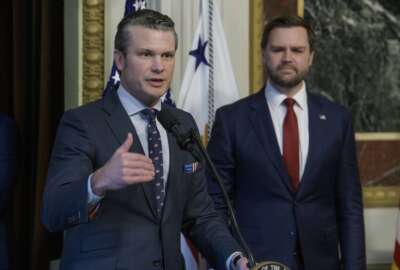Hewlett Packard is joining forces with AT&T, Northrop Grumman and IBM to help seal the deal for the Navy’s $14.5 billion Next Generation Enterprise Network contract. The request for proposals is expected Dec. 21. Washington Technology reports that by combining forces, HP hopes to gain a competitive advantage. HP hopes each member of the team brings something to the table. AT&T has telecommunications, Northrop Grumman excels in command and control and IBM is prominent in IT. (Washington Technology)
The Federal Communications Commission says the plan to bring broadband Internet to rural America could produce a half-million jobs. NextGov reports that the FCC is looking to create more than 111,000 jobs per $1 billion spent. The agency plans to redirect $4.5 billion from landline operations at rural phone companies toward broadband. They believe it’ll take about six years to create more than 500,000 jobs. (NextGov)
Boeing says the fleet of new tankers it’s building for the Air Force is getting more expensive than planned. The project could bust its budget by as much as $500 million. That’s $200 million more that previous estimates for the Defense Department. Washington Post reports, Boeing absorbs 100 percent of the cost over the contract’s $4.8 billion ceiling. The contract’s program manager says if costs rise another half-billion dollars, Boeing could be looking at zero-profit on the deal. (Washington Post)
The House is preparing to vote on a bill to make changes to the Federal Employees’ Compensation Act. Under the new bill medical assistants and nurses would be permitted to certify disability resulting from traumatic injury. The bill also extends compensation under FECA for death or disability caused by a terrorist attack. Benefit amounts for funereal expenses are also increased. The bill is scheduled for a vote tomorrow. (Federal News Radio)
U.S. Central Command will open its own investigation into the NATO airstrikes in Pakistan that killed 24 Pakistani soldiers. NATO is already investigating. The incident has touched off a diplomatic and military emergency between the the United States and Pakistan. Gen. James Mattis, head of Centcom, is expected to name an investigating officer today. The main question is who authorized the helicopter strikes and why. In retaliation, Pakistan has cut off military supply routes into Afghanistan and called for the CIA to stop drone activity in the border area. (Federal News Radio)
NASA’s James Webb Space Telescope gets a reprieve on funding for 2012. The project had been zeroed out by the House because it is over-budget. But NextGov reports, the appropriations bill approved in House and Senate conference last week includes more than $500 million for the Webb Telescope. NASA hopes to launch the telescope in 2018. It it now projected to cost a total of $8 billion. In their report, conferees said they had to cut other NASA programs to keep the Webb Telescope alive. (NextGov)
Veterans Affairs is claiming victory in control over its technology projects. CIO Roger Baker says the department met 89 percent of project milestones this year, up from 30 percent two years ago. He credits the Performance Management and Accountability System, established in 2009. PMAS lets department managers move people and money around to where it can do the most good. Baker calls the improvement a cultural change. Besides fixing late or overbudget projects, VA has also been willing to ditch some efforts altogether. (Federal News Radio)
The Chevy Volt might be the most federally subsidized car ever. Now it is under the microscope of The National Highway Traffic Safety Administration. At issue is whether crashes cause the car’s lithium ion batteries to become fire prone. Earlier this year, the agency smashed up a Volt to test for passenger protection. The damaged battery caught fire three weeks later. In subsequent tests, batteries either got too hot or started sparking. Now the safety agency says it will dig deeper into the car’s battery safety. NHTSA says it has no reports of roadway crashes causing battery fires. (NHTSA)
Today is budget passback day for your agency. The Office of Management and Budget is literally passing back draft budget proposals for the next fiscal year. It heads off a series of negotiations between agencies, departments and the White House on the road to completing a final budget proposal. Final proposals are due in January. OMB used to passback budgets before Thanksgiving. The Washington Post reported OMB Director Jack Lew moved the date to the last Monday in November — after the holiday — calling the previous schedule “cruel and unusual” for federal managers. (Washington Post)
Copyright
© 2025 Federal News Network. All rights reserved. This website is not intended for users located within the European Economic Area.





